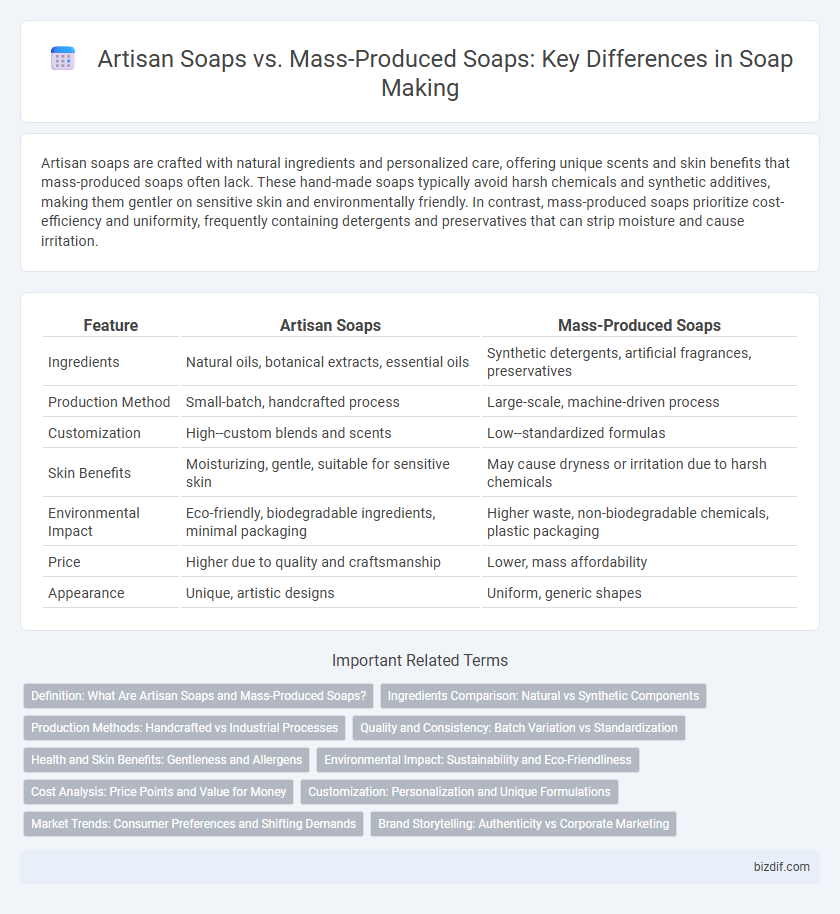Artisan soaps are crafted with natural ingredients and personalized care, offering unique scents and skin benefits that mass-produced soaps often lack. These hand-made soaps typically avoid harsh chemicals and synthetic additives, making them gentler on sensitive skin and environmentally friendly. In contrast, mass-produced soaps prioritize cost-efficiency and uniformity, frequently containing detergents and preservatives that can strip moisture and cause irritation.
Table of Comparison
| Feature | Artisan Soaps | Mass-Produced Soaps |
|---|---|---|
| Ingredients | Natural oils, botanical extracts, essential oils | Synthetic detergents, artificial fragrances, preservatives |
| Production Method | Small-batch, handcrafted process | Large-scale, machine-driven process |
| Customization | High--custom blends and scents | Low--standardized formulas |
| Skin Benefits | Moisturizing, gentle, suitable for sensitive skin | May cause dryness or irritation due to harsh chemicals |
| Environmental Impact | Eco-friendly, biodegradable ingredients, minimal packaging | Higher waste, non-biodegradable chemicals, plastic packaging |
| Price | Higher due to quality and craftsmanship | Lower, mass affordability |
| Appearance | Unique, artistic designs | Uniform, generic shapes |
Definition: What Are Artisan Soaps and Mass-Produced Soaps?
Artisan soaps are handcrafted products made in small batches using traditional methods and natural ingredients, often incorporating unique scents, textures, and skin-beneficial additives like essential oils and organic botanicals. Mass-produced soaps are manufactured on a large scale using synthetic ingredients, chemical detergents, and standardized formulas designed for uniformity, cost-efficiency, and extended shelf life. The primary difference lies in the production process and ingredient quality, where artisan soaps emphasize craftsmanship and natural components while mass-produced soaps prioritize volume and consistency.
Ingredients Comparison: Natural vs Synthetic Components
Artisan soaps predominantly feature natural ingredients such as vegetable oils, essential oils, and plant-based butters, providing gentle, skin-nourishing properties free from synthetic chemicals. Mass-produced soaps often contain synthetic detergents, artificial fragrances, and preservatives, which can strip the skin of natural oils and cause irritation. The emphasis on natural components in artisan soaps results in a higher-quality product that supports sensitive skin and environmental sustainability.
Production Methods: Handcrafted vs Industrial Processes
Artisan soaps are crafted using traditional hand-mixing and small-batch curing methods, ensuring natural ingredients and customizable formulations. In contrast, mass-produced soaps rely on automated industrial processes with synthetic additives to maximize output and shelf life. Handcrafted production emphasizes quality, ingredient transparency, and skin-friendly properties compared to the efficiency-focused manufacturing of commercial soap bars.
Quality and Consistency: Batch Variation vs Standardization
Artisan soaps typically exhibit unique batch variations due to handcrafted processes, resulting in distinct textures, colors, and scents that emphasize natural ingredients and customization. In contrast, mass-produced soaps prioritize consistency and standardization, using automated production lines to maintain uniform quality, packaging, and fragrance across large quantities. This standardization ensures predictable shelf life and consumer experience, while artisan soaps often offer superior ingredient quality but less uniformity in each bar.
Health and Skin Benefits: Gentleness and Allergens
Artisan soaps are crafted with natural ingredients, often free from harsh chemicals, making them gentler on sensitive skin and less likely to cause allergic reactions compared to mass-produced soaps that frequently contain synthetic fragrances and preservatives. These handmade soaps retain glycerin, a natural humectant that helps maintain skin moisture, whereas commercial soaps commonly remove glycerin during processing, leading to dryness. Consumers seeking skin-friendly options benefit from artisan soaps' tailored formulations that minimize irritants and support skin health.
Environmental Impact: Sustainability and Eco-Friendliness
Artisan soaps generally offer greater environmental sustainability due to their use of natural, biodegradable ingredients and minimal packaging, reducing waste and pollution compared to mass-produced soaps. Smaller batch production in artisan soap making limits resource consumption and allows for the incorporation of organic oils and sustainable sourcing practices. Mass-produced soaps often rely on synthetic additives and large-scale manufacturing processes that increase carbon footprints and contribute to harmful environmental runoff.
Cost Analysis: Price Points and Value for Money
Artisan soaps typically have higher price points ranging from $7 to $15 per bar due to handcrafted processes, premium ingredients like essential oils and natural botanicals, and smaller production scales. Mass-produced soaps often cost between $1 to $3 per bar, benefiting from bulk manufacturing and synthetic additives that reduce production expenses. While artisan soaps offer superior skin benefits and unique fragrances justifying their cost, mass-produced options provide affordability but may lack the therapeutic properties and craftsmanship valued by discerning consumers.
Customization: Personalization and Unique Formulations
Artisan soaps offer extensive customization through personalized scents, natural ingredients, and tailored formulations that cater to specific skin types or preferences, unlike mass-produced soaps which rely on standardized recipes and synthetic additives. These handcrafted soaps often incorporate unique botanical extracts, essential oils, and colorants, providing distinct textures and therapeutic benefits. Customization in artisan soaps enhances user experience and supports niche markets seeking eco-friendly, chemical-free products.
Market Trends: Consumer Preferences and Shifting Demands
Artisan soaps witness growing consumer demand due to their natural ingredients, unique scents, and skin-friendly properties, contrasting with the generic formulas of mass-produced soaps. Market trends indicate a shift towards eco-friendly, handcrafted products that emphasize sustainability and ethical sourcing, attracting health-conscious and environmentally aware buyers. This preference drives a niche market growth, challenging traditional soap manufacturers to innovate and adapt to evolving consumer values.
Brand Storytelling: Authenticity vs Corporate Marketing
Artisan soaps emphasize brand storytelling rooted in authenticity, showcasing handcrafted processes, unique ingredients, and personal narratives that resonate with consumers seeking genuine experiences. In contrast, mass-produced soaps rely on corporate marketing strategies, highlighting broad appeal, standardized quality, and extensive distribution networks to attract large audiences. The authentic connection of artisan soap brands often drives customer loyalty, while corporate marketing focuses on brand recognition and market penetration.
Artisan Soaps vs Mass-Produced Soaps Infographic

 bizdif.com
bizdif.com